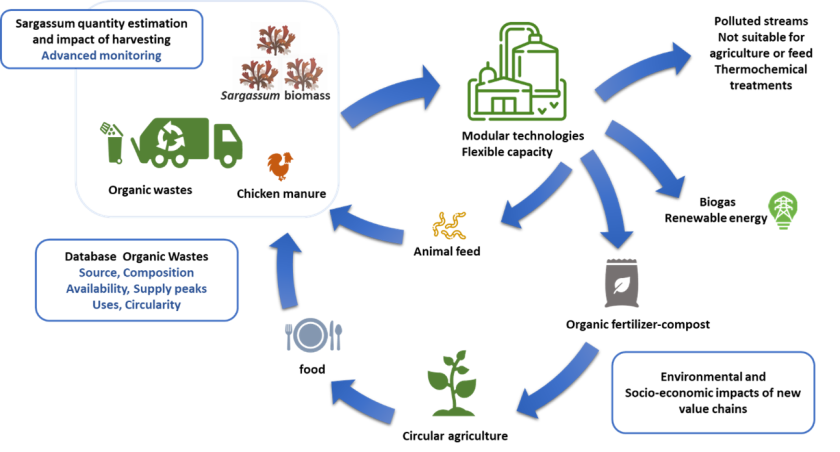
Project
Circular uses of organic biomass streams in Bonaire
Circular approaches to sustainable management of organic streams in Bonaire will be developed. The Sargassum seaweed from influxes will be incorporated to these streams. In collaboration with local stakeholders, organic residues will be mapped and assessed on circularity of (current) uses and expected development over time.
In this project circular approaches to sustainable management of organic waste streams in the Dutch Caribbean, using Bonaire as a case study will be developed. At Bonaire, organic waste is collected jointly with other waste and mostly landfilled. This causes GHG emissions, nutrient leakage and eutrophication of natural environments and the coastal habitat. The biomass collected from the Sargassum seaweed influxes, that cause severe environmental damage in the coastal ecosystems when not harvested nearshore, will be incorporated to the waste streams. Organic residues and wastes (food waste, agricultural residues, manure, garden waste, Sargassum, etc.) will be mapped and assessed in terms of amounts over the year, composition, current uses and potential uses, circularity of current uses and expected development over time. Sargassum biomass, that currently is disposed of, will be valorised with the other organic wastes thereby creating (more) circular value-chains that contribute to regenerating natural (marine) habitats and agriculture.

Because of the diversity of wastes, several applications will be studied: 1) Direct applications for food/feed products, 2) Applications of (mixed) organic waste streams, digestate from anaerobic digestion and wastewater as substrate for compost or soil enhancers (reducing imports of comport and fertilizer) and 3) The production of biogas (for electricity generation, replacing fossil diesel) and digestate based compost from the organic wastes and Sargassum. Depending on the content in heavy metals, or other toxic components of the organic wastes, “clean” and “polluted“ conversion systems will be designed. This will avoid that polluted organic wastes enter the feed and food chain or end up on agricultural land (compost) or nature. Environmental, social and economic impacts will be assessed for the value chains. In addition, knowledge exchange will be realised with other Caribbean islands by joint events (workshops, meetings, etc) to maximize the impacts and efficiency of the project.
In BONCIRC the Wageningen Research groups have teamed up with Dutch businesses and local stakeholders involved in agriculture and organic waste management, production and use to develop and start implementation of more circular and environmentally friendly uses of organic wastes and Sargassum. The Bonaire Department of Agriculture, livestock farming and Fisheries, (LVV), the waste collecting company of Bonaire (Selibon), Punta Blancu Chicken farm (supplying most eggs on Bonaire)and the Water and Energy company in Bonaire (WEB) are partners of the project. Because of the multidisciplinary approach needed to reach the goals of the project, several Wageningen Research groups are involved: Marine Research (WMR), Economic Research (WEcR), Plant Research (WPR) and Food and Biobased Research (WFBR) (coordinator). The lead applicant, All Optimal BV (Development of anaerobic digestion plants) has unique experience on organic waste and Sargassum biomass digestion from previous work in the French Caribbean and the company Together for the better good will explore possible business development for the new processes.
Bekijk de video
- Unfortunately, your cookie settings do not allow videos to be displayed. - check your settings